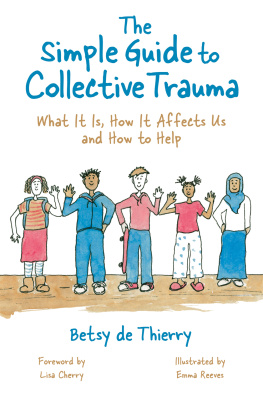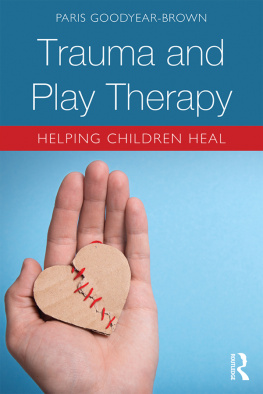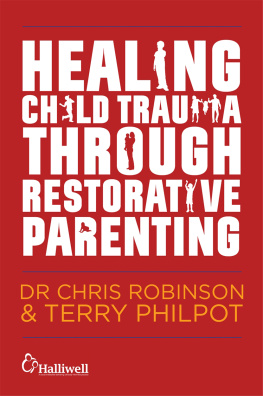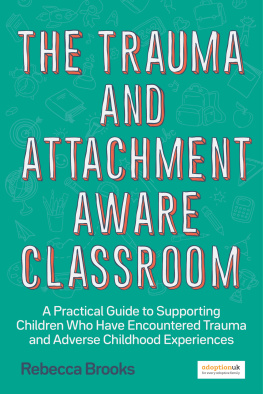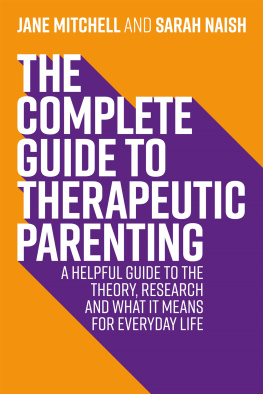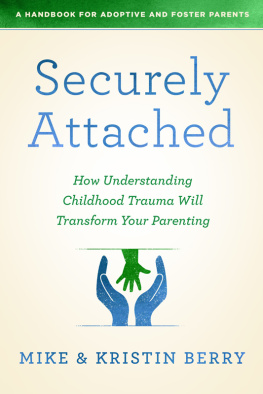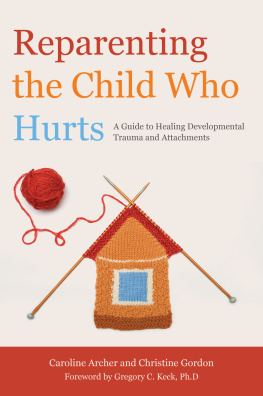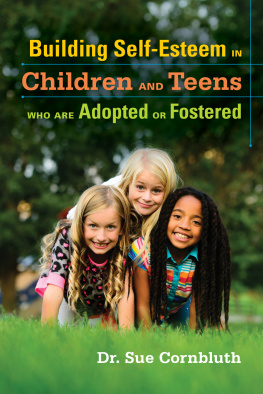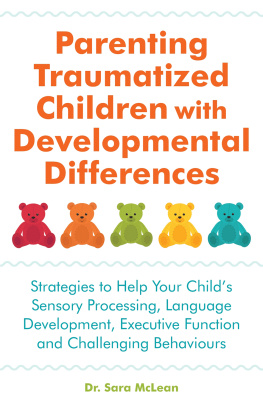
What a fantastic resource for all who are concerned with parenting, teaching and supporting children who have experienced developmental trauma. As the title suggests, Christine Gordon explains so articulately and thoroughly why children who have been harmed in their early years can be very challenging to parent, how the children feel about themselves, how they experience relationships and the world about them, how to support their healing through developmental reparenting. The uniqueness and innovation in this resource is in the practical nature of connecting executive functioning difficulties the why does my child do this? to the what can I do? and what can I say?
Packed full of ideas, suggestions and resources for strategies and interventions, all clearly written by Christine, and wonderfully illustrated by Corinne Watt, this book is not to be missed highly recommended.
Edwina Grant, Chair of Scottish Attachment In Action
This book will be of great help to adults who care for children with developmental trauma. Christine Gordon deftly helps to close the gap between understanding these children and knowing what to do to provide the consistently compassionate care they need to recover from the effects of early life trauma.
Jonathan Baylin, PhD, co-author with Daniel Hughes of The Neurobiology of Attachment-focused Therapy
by the same author
New Families, Old Scripts
A Guide to the Language of Trauma and Attachment in Adoptive Families
Caroline Archer and Christine Gordon
ISBN 978 1 84310 258 8
eISBN 978 1 84642 482 3
Reparenting the Child Who Hurts
A Guide to Healing Developmental Trauma and Attachments
Caroline Archer and Christine Gordon
ISBN 978 1 84905 263 4
eISBN 978 0 85700 568 7
of related interest
Why Cant My Child Behave?
Empathic Parenting Strategies that Work for Adoptive and Foster Families
Dr Amber Elliot
ISBN 978 1 84905 339 6
eISBN 978 0 85700 671 4
Sulky, Rowdy, Rude?
Why kids really act out and what to do about it
Bo Hejlskove Elvn and Tina Wiman
ISBN 978 1 78592 213 8
eISBN 978 1 78450 492 2
A Non-Violent Resistance Approach with Children in Distress
A Guide for Parents and Professionals
Carmelite Avraham-Krehwinkel and David Aldridge
ISBN 978 1 84310 484 1
eISBN 978 0 85700 217 4
Responding to Child to Parent Violence and Abuse
Family Interventions with Non Violent Resistance
Dr Declan Coogan
ISBN 978 1 84905 711 0
eISBN 978 1 78450 231 7
Parenting Strategies to Help Adopted and Fostered Children with Their Behaviour
Trauma-Informed Guidance and Action Charts
Christine Gordon
Illustrations by Corinne Watt

Jessica Kingsley Publishers
London and Philadelphia
First published in 2018
by Jessica Kingsley Publishers
73 Collier Street
London N1 9BE, UK
and
400 Market Street, Suite 400
Philadelphia, PA 19106, USA
www.jkp.com
Copyright Christine Gordon 2018
Front cover image source: Shutterstock. The cover image is for illustrative purposes only, and any person featuring is a model.
All rights reserved. No part of this publication may be reproduced in any material form (including photocopying, storing in any medium by electronic means or transmitting) without the written permission of the copyright owner except in accordance with the provisions of the law or under terms of a licence issued in the UK by the Copyright Licensing Agency Ltd. www.cla.co.uk or in overseas territories by the relevant reproduction rights organisation, for details see www.ifrro.org . Applications for the copyright owners written permission to reproduce any part of this publication should be addressed to the publisher.
There are supplementary materials and all charts can be downloaded at www.jkp.com/voucher for personal use with this program, but may not be reproduced for any other purposes without the permission of the publisher.
Warning: The doing of an unauthorised act in relation to a copyright work may result in both a civil claim for damages and criminal prosecution.
Library of Congress Cataloging in Publication Data
A CIP catalog record for this book is available from the Library of Congress
British Library Cataloguing in Publication Data
A CIP catalogue record for this book is available from the British Library
ISBN 978 1 78592 386 9
eISBN 978 1 78450 738 1
Printed and bound in Great Britain
The accompanying PDF can be downloaded from www.jkp.com/voucher using the code GORDONPARENT
This book is dedicated to all the parents we have worked with at ADAPT Scotland. Your commitment to your children and willingness to embrace the principles of developmental reparenting have not only provided the best environment for your children to thrive, but have also given me the opportunity to practise the ideas that are the central focus of this book. I thank each and every one of you for allowing me to do this.
Christine Gordon
Contents
Preface
The aim of this book is to help parents, carers and teachers understand the profound impact of pre- and post-birth toxic environments. The impact of exposure to drugs and alcohol or to the stress of domestic violence in the womb, birth trauma, neglect, physical and sexual abuse and multiple separations, singly or in combination, have been widely researched and documented. This research highlights the impairment to childrens psychological, neurological and physiological development of living in these environments. This book explores why these early experiences can continue to impact children after babyhood and when they are placed in safe and stable family environments.
This book also aims to help parents, carers and teachers find ways to move beyond understanding why children act in the way they do to what they can do to actively address the behavioural issues that traumatized children often display.
The book is divided into two parts: the first focuses on the why of the behavioural difficulties many traumatized children display, the second part comprises charts that outline the why of specific behavioural challenges, alongside what you can do to address these issues. If you are struggling with particular behaviours you might want to move straight to the charts. That is fine. This is not a book that needs to be read in a linear fashion. Use it in the way that is most helpful to you. However, I hope that the charts will inspire you to read the more detailed analysis contained in part one to deepen your understanding of the why and help you to develop your own what charts that are more reflective of you and your children. For this reason, I have included a blank chart in the book. Please feel free to use this to develop your own charts that are specific to you and your child. I have provided some suggestions; you know yourself and your child and will, I hope, be able to use my suggestions to find a solution that works for your family.
Introduction
The complexity and profound nature of the impact of early trauma led to a group of scientists including Bessel van der Kolk to make the case that a diagnosis of developmental trauma disorder should be included in the Diagnostic and Statistical Manual of Mental Disorders, 5th edition (DSM-5 is the standard classification of mental disorders used by mental health professionals). Van der Kolk believed that developmental trauma disorder provided the best diagnosis to date to explain the multifarious ways in which childhood trauma impacts children and the reason why trauma has such a long-lasting affect, even after children are removed from their traumatic surroundings and placed in loving families.
Next page

